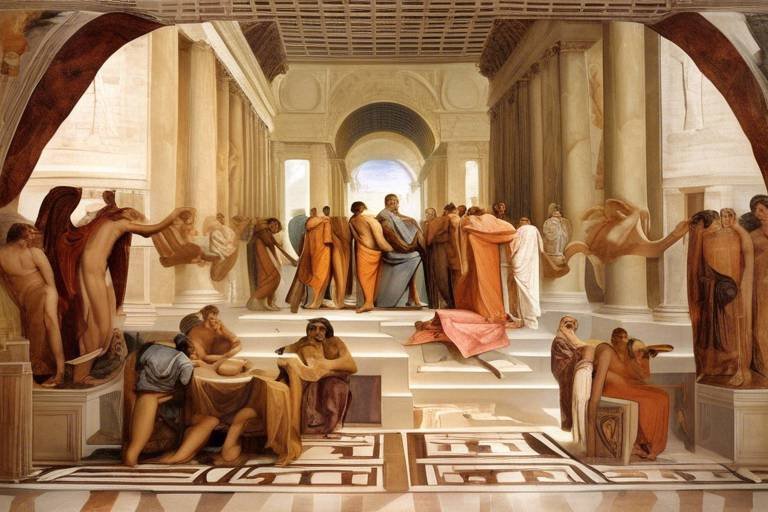The Metaphysics of Identity - A Philosophical Study
This article explores the complexities of identity through a metaphysical lens, examining various theories, concepts, and implications that shape our understanding of self and existence.
The concept of identity is as intricate as the human experience itself. At its core, identity refers to the qualities, beliefs, personality traits, and expressions that define an individual or a group. Philosophers have grappled with this idea for centuries, offering various interpretations and frameworks to understand what it means to be "us." Identity isn't just a label we wear; it's a dynamic tapestry woven from our experiences, relationships, and even the societal roles we adopt. In contemporary discourse, identity has become a crucial topic, particularly as we navigate the complexities of multiculturalism, globalization, and digital existence.
One of the most profound questions in philosophy revolves around personal identity: How do we remain the same person over time, despite the changes we undergo? This inquiry digs deep into issues of memory, consciousness, and the implications of change. Are we merely a collection of experiences, or is there an unchanging essence that persists through our lives? The exploration of personal identity invites us to reflect on our own lives and how we perceive ourselves as evolving beings.
Psychological continuity plays a pivotal role in maintaining our sense of identity, despite the inevitable physical changes we experience throughout our lives. Think of it like a river; while the water flows and changes, the river itself remains recognizable. Our memories, personality traits, and emotional responses serve as the currents that shape our identity. This psychological framework raises essential questions: If we were to lose our memories, would we still be the same person? Can we separate our identity from our past experiences? These questions challenge us to consider the essence of what makes us "us."
Memory is a cornerstone of our understanding of self. It acts as a bridge connecting our past to our present, allowing us to construct a narrative that defines who we are. However, the reliability of memory is often debated in philosophical circles. Memories can be distorted, forgotten, or even fabricated, leading to the question: If our memories are unreliable, how can they form the basis of our identity? This dilemma invites us to consider alternative views of identity that may not rely solely on memory but also encompass our actions, relationships, and even our aspirations.
Consciousness is another vital aspect of identity. It is our awareness of ourselves and our surroundings, shaping how we perceive our identity. When we reflect on our thoughts, feelings, and experiences, we engage in a form of self-exploration that can lead to profound insights about who we are. This self-awareness influences our choices, relationships, and ultimately, our identity. The interplay between consciousness and identity raises intriguing questions: Does consciousness shape our identity, or is our identity merely a product of our conscious thoughts? The answers to these questions can vary widely, depending on philosophical perspectives.
While psychological factors are crucial, the significance of the physical body in discussions about identity cannot be overlooked. Our bodies are not just vessels; they are integral to our identity. Consider the experience of aging: as our bodies change, so too do our perceptions of ourselves. Some argue that our physical form is essential to our identity, while others contend that identity is more fluid and can transcend physicality. This debate invites a deeper exploration of how we relate to our bodies and the impact of physical changes on our sense of self.
As we delve into the philosophical theories surrounding identity, we encounter a myriad of perspectives that seek to explain this complex concept. From essentialism, which posits a fixed essence of identity, to existentialism, which emphasizes freedom and the fluidity of self-conception, each theory offers unique insights. Constructivism further complicates the discussion by arguing that identity is socially constructed, shaped by cultural, historical, and relational contexts. Understanding these theories can deepen our appreciation for the rich tapestry of identity and how it influences our lives.
Essentialism and existentialism represent two contrasting views on identity. Essentialists argue that there is a core essence that defines us, a stable identity that persists regardless of external changes. In contrast, existentialists embrace the idea that identity is not predetermined; it is fluid and shaped by our choices and experiences. This philosophical tug-of-war invites us to reflect on our own beliefs about identity: Are we defined by our essence, or are we free to create our identity anew with each passing day?
Constructivist theories present another fascinating angle on identity. They argue that our sense of self is not an inherent quality but rather a construct influenced by our social interactions and cultural contexts. This perspective highlights how identity can shift and evolve based on our relationships, experiences, and the societal narratives we encounter. It challenges us to consider how much of our identity is truly our own and how much is shaped by the world around us.
- What is the main question regarding personal identity? The primary question revolves around how we remain the same person over time despite changes in our memories, experiences, and physical forms.
- How do memories affect our identity? Memories serve as a foundation for our self-narrative, connecting our past experiences to our present self, but their reliability can be questioned.
- Is identity fixed or fluid? This is a debated topic; essentialists argue for a fixed identity, while existentialists and constructivists see identity as fluid and shaped by experiences and social contexts.

The Nature of Identity
When we dive into the depths of identity, we find ourselves grappling with a concept that is as complex as it is fundamental to our understanding of existence. Identity isn't just a label we wear; it's the very essence of who we are, shaped by our experiences, beliefs, and interactions with the world around us. Throughout philosophical history, thinkers have wrestled with the question: What does it mean to be 'you'? This inquiry leads us to explore various definitions and characteristics of identity, which can be broadly categorized into two main dimensions: personal identity and social identity.
Personal identity refers to the characteristics that make an individual unique, encompassing traits such as memories, beliefs, and personality. It's like a fingerprint—no two individuals share the exact same identity. On the other hand, social identity is influenced by our affiliations with groups, cultures, and communities. Think of it as the roles we play in the theater of life; the masks we wear can change depending on the audience. This duality of identity raises intriguing questions about the nature of selfhood and how it evolves over time.
Historically, philosophers have approached identity through various lenses. For instance, Plato suggested that identity is tied to an eternal essence, while Aristotle emphasized the importance of substance and form. Fast forward to the modern era, and we encounter thinkers like John Locke, who proposed that consciousness and memory are central to personal identity. This evolution of thought highlights how our understanding of identity is not static; it's a living, breathing concept that adapts as we do.
In contemporary discourse, identity has taken on even more layers, particularly with the rise of digital identities and the impact of social media. We now curate our identities online, presenting a version of ourselves that may differ from our offline personas. This phenomenon begs the question: Are we truly being authentic, or are we merely performing for an audience? The implications of this are profound, as they challenge the very notion of what it means to 'know' oneself.
Moreover, the intersection of identity with various social constructs—such as race, gender, and class—further complicates our understanding. Each of these elements contributes to the tapestry of our identity, influencing how we perceive ourselves and how others perceive us. In a world that often seeks to categorize and label, it's essential to recognize the fluidity and multiplicity of identity. It’s not just about who we are, but about who we can become.
As we explore the nature of identity, we must also consider the implications of change. Just as a river is never the same from one moment to the next, our identities are constantly evolving. This dynamic nature raises philosophical questions about continuity and persistence. How do we remain 'us' when so much around us—and within us—changes? This inquiry leads us deeper into the realms of personal and physical continuity, which we will explore in the following sections.

Personal Identity Over Time
When we think about personal identity, a million questions swirl in our minds. Who are we really? Are we the same person we were ten years ago? These questions delve into the philosophical rabbit hole of identity, particularly how it evolves over time. Our identities are not static; they are dynamic, shaped by a myriad of factors, including our experiences, memories, and even our physical selves. It’s like watching a river flow—while the water may seem the same, it is constantly changing, adapting to new surroundings and circumstances. This fluidity raises profound questions about the essence of who we are and what it means to maintain a sense of self throughout our lives.
One of the core issues in the discussion of personal identity over time is the concept of continuity. Philosophers have long debated what it means to be the same person at different stages of life. Is it our memories that bind us together, or is it our consciousness? Perhaps it’s a combination of both? To illustrate this, consider the following points:
- Memory: Our memories are like the threads that weave the fabric of our identity. They create a narrative that connects our past selves to our present.
- Consciousness: The awareness we have of ourselves plays a crucial role in our identity. It’s not just about recalling past experiences; it’s about recognizing that those experiences shape who we are today.
- Change: As we grow and evolve, we often undergo significant changes in personality, beliefs, and even values. How do these transformations impact our sense of identity?
To further explore these themes, we can break down the discussion into two main categories: psychological continuity and physical continuity. Psychological continuity emphasizes the importance of our mental states—our memories, thoughts, and personality traits. Imagine a person who, despite undergoing major life changes, still retains their core values and memories. This psychological thread can provide a sense of continuity, even if their external circumstances have drastically shifted.
Psychological continuity suggests that our identities are maintained through the persistence of psychological connections. For instance, if you think back to your childhood, the memories you hold onto can serve as anchors that keep you tethered to your earlier self. These memories are not just snapshots; they are rich narratives filled with emotions and experiences that shape your current identity. However, the reliability of memory is often called into question. Can we trust our memories, or are they merely reconstructions influenced by time and perception? This debate leads us to the philosophical exploration of memory and identity.
Memory plays a pivotal role in forming our identities. Philosophers like John Locke argued that personal identity is tied to memory; if you can remember an experience, it contributes to your sense of self. However, the reliability of memory can be problematic. Our memories can be distorted, forgotten, or even fabricated. This raises a critical question: If our memories are unreliable, what does that mean for our identity? Are we still the same person if our recollections of the past are flawed? This philosophical conundrum emphasizes the complexity of identity and the challenges we face in defining it.
Another crucial aspect of personal identity is consciousness. The awareness we have of ourselves and our experiences plays a significant role in shaping our identity. When we reflect on our lives, we engage in a process of self-examination that can affirm or alter our sense of self. This self-awareness allows us to question our beliefs and values, leading to personal growth and transformation. In this way, consciousness acts as a mirror, reflecting our evolving identity back to us. But what happens when our consciousness shifts, perhaps due to trauma or significant life events? How does that impact our sense of who we are? These are the types of questions that keep philosophers up at night!
While psychological factors are undeniably important, we cannot overlook the role of the physical body in discussions of identity. Our bodies are the vessels through which we experience the world, and they often serve as a point of connection to our identity. Consider a scenario where someone undergoes drastic physical changes—such as through illness or surgery. Does this alter their identity? Some argue that our physical form is integral to who we are, while others contend that our essence transcends the physical. This ongoing debate highlights the complexity of identity and the various dimensions that contribute to our understanding of self.
1. What is personal identity?
Personal identity refers to the concept of what it means to be a person over time, encompassing the continuity of self through memories, consciousness, and physical presence.
2. How do memories affect our identity?
Memories shape our narratives and provide a connection between our past and present selves, influencing how we perceive and understand our identity.
3. Can identity change over time?
Yes, personal identity can evolve due to experiences, changes in beliefs, and shifts in consciousness, making it a dynamic and fluid concept.
4. Is physical appearance important for identity?
While some argue that physical appearance is integral to identity, others believe that our essence transcends our physical form, focusing instead on psychological factors.

Psychological Continuity
The concept of plays a pivotal role in our understanding of personal identity. It suggests that our identity is not merely a product of our physical presence but is deeply rooted in our mental states—our memories, thoughts, and personality traits. Imagine a river: while the water may flow and change, the essence of the river remains. Similarly, our identity can evolve over time, shaped by experiences and memories, yet still retain a core sense of self. This raises fascinating questions: What makes us who we are? Is it the continuity of our memories or the consistency of our psychological traits?
Philosophers like John Locke have argued that memory is central to this continuity. He posited that if you can remember an experience from your past, it contributes to your identity in the present. However, this idea is not without its challenges. For instance, consider the case of someone suffering from amnesia. Their inability to recall past experiences raises the question: Are they still the same person? If memories are integral to our identity, what happens when those memories fade away?
Furthermore, the role of personality traits cannot be overlooked. Our unique characteristics—such as being introverted, adventurous, or empathetic—play a significant part in shaping our identity. These traits often remain stable over time, providing a sense of continuity even amidst life’s inevitable changes. However, they can also evolve due to experiences, relationships, and personal growth. This dynamic interplay between memory and personality leads us to ponder whether we are truly the same person we were a decade ago.
In the realm of psychological continuity, the concept of self-awareness also emerges as a crucial factor. Self-awareness allows us to reflect on our thoughts and feelings, creating a narrative that ties our past, present, and future together. This narrative is not just a collection of memories; it is the story we tell ourselves about who we are. It gives us a sense of coherence and purpose, even as we navigate the complexities of life.
However, the reliability of memory is often questioned. Studies in psychology reveal that memories can be malleable and subject to distortion. This raises an intriguing dilemma: If our memories can change, can our identity also shift? The answer is both yes and no. While our core identity may remain intact, the way we perceive and understand ourselves can evolve based on new experiences and insights.
To sum up, psychological continuity is a multifaceted concept that intertwines memory, personality, and self-awareness. It emphasizes that our identity is not static but rather a fluid tapestry woven from the threads of our experiences and psychological states. Understanding this continuity is essential as it shapes how we view ourselves and our place in the world.
- What is psychological continuity? Psychological continuity refers to the idea that our identity is maintained through the continuity of our mental states, including memories and personality traits.
- How do memories affect our identity? Memories play a crucial role in shaping our sense of self. They help create a narrative that connects our past experiences to our current identity.
- Can identity change over time? Yes, identity can change as our memories and personality traits evolve due to new experiences and personal growth.
- What role does self-awareness play in identity? Self-awareness allows us to reflect on our thoughts and feelings, contributing to a coherent sense of identity over time.

Memory and Identity
Memory is not just a collection of past experiences; it is the very fabric that weaves together our identity. Think about it: each memory serves as a thread, stitching together the narrative of who we are. When we reminisce about a childhood birthday party or the first time we rode a bike, we are not merely recalling events; we are reinforcing our sense of self. This connection between memory and identity raises profound philosophical questions: Can we truly be the same person if we forget significant parts of our past? What happens to our identity in the face of memory loss?
Philosophers have long debated the reliability of memory as a foundation for personal identity. Some argue that our memories are often distorted or unreliable, suggesting that they can’t be the sole basis for our identity. For instance, consider the phenomenon of false memories—those vivid recollections that turn out to be fabrications of our mind. If our memories can deceive us, can we trust them to define who we are? This conundrum leads to an intriguing exploration of the nature of selfhood.
Moreover, the role of memory in identity can be viewed through various lenses:
- Continuity: Many theories posit that personal identity is maintained through psychological continuity, where memories create a sense of connectedness over time.
- Fragmentation: In contrast, some argue that our identity is fragmented, shaped by the multitude of experiences we accumulate, leading to a more dynamic and less stable sense of self.
- Reconstruction: Others propose that we actively reconstruct our identity through memories, suggesting that our current self influences how we remember past events.
In essence, memory acts as a bridge between our past and present selves, allowing us to navigate the complexities of identity. It’s a bit like a book where each chapter represents a different phase of our lives. While the chapters may change, the overarching narrative remains intact. But what happens when pages are torn or lost? The story becomes incomplete, and so does our understanding of who we are.
This exploration of memory and identity also opens the door to discussions about the implications of memory-related conditions, such as Alzheimer's disease. Individuals suffering from such conditions often experience a profound disconnection from their identities, as they lose the memories that define them. This raises ethical questions about the essence of identity: Is it solely based on memory, or is there something deeper that persists despite the loss of recollections?
Ultimately, the relationship between memory and identity is a complex tapestry woven from threads of experience, perception, and continuity. Understanding this interplay not only enriches our philosophical discussions but also invites us to reflect on our own lives. How do our memories shape our identities? Are we merely the sum of our recollections, or is there a more profound essence that defines us?
- What role does memory play in shaping our identity? Memory helps create a narrative of our lives, connecting past experiences to our present self.
- Can we have an identity without memories? Philosophically, it’s debated whether identity can exist independently of memory, as memories are crucial for continuity.
- How do false memories affect our sense of self? False memories can lead to a distorted sense of identity, raising questions about the reliability of our recollections.
- What happens to identity in memory loss? Memory loss can cause individuals to feel disconnected from their identity, as they lose the memories that define them.

Consciousness and Self
When we think about consciousness and its relationship with the self, we enter a fascinating realm that challenges our understanding of identity. What does it mean to be aware of ourselves? How does our consciousness shape our perception of who we are? These questions have puzzled philosophers for centuries, and they remain as relevant today as ever. Consciousness can be likened to a stage where the play of our identity unfolds, with each thought and experience acting as a performer. But what happens when the curtain falls, or when the performance changes?
At its core, consciousness provides us with a sense of continuity. It allows us to reflect on our past, engage with the present, and anticipate the future. This temporal awareness is crucial for our identity, as it enables us to weave together the various threads of our experiences into a cohesive narrative. Think of it like a tapestry; each memory, feeling, and thought is a thread that contributes to the overall picture of who we are. Without consciousness, this tapestry would be a chaotic mess of colors, lacking form and meaning.
However, the relationship between consciousness and identity is not as straightforward as it might seem. For instance, consider the phenomenon of amnesia. When someone loses their memory, they often feel as though they have lost a part of themselves. This raises a critical question: if our memories are integral to our identity, what happens to the self when those memories fade? In this way, consciousness is not just a passive observer; it actively shapes our self-concept. It’s like a sculptor chipping away at a block of marble, revealing the form within.
Moreover, the self-awareness that arises from consciousness plays a crucial role in our interactions with others and the world around us. It allows us to recognize our emotions, understand our motivations, and even empathize with others. This social dimension of consciousness is vital for building relationships and forming our identity in a communal context. We are not just isolated beings; we are part of a larger social fabric, and our consciousness helps us navigate this complex landscape.
To illustrate this point further, consider the following aspects of how consciousness influences our sense of self:
- Reflection: Consciousness enables us to think critically about our experiences, allowing for personal growth and self-improvement.
- Empathy: By being aware of our own feelings, we can better understand and relate to the emotions of others.
- Decision-Making: Conscious awareness helps us weigh our choices and make informed decisions that align with our identity.
In conclusion, consciousness is not merely a backdrop to our existence; it is an active participant in the formation of our identity. It shapes our memories, influences our relationships, and guides our decisions. As we continue to explore the depths of consciousness, we uncover new layers of understanding about ourselves and our place in the world. The interplay between consciousness and self is a dynamic dance, one that invites us to ponder the very essence of who we are.
Here are some common questions related to consciousness and identity:
- What is the role of consciousness in shaping our identity? Consciousness allows us to reflect on our experiences, integrate memories, and understand our emotions, all of which contribute to a cohesive sense of self.
- Can identity exist without consciousness? It's challenging to conceive of identity without consciousness, as awareness is fundamental to recognizing and understanding oneself.
- How do changes in consciousness affect our identity? Changes in consciousness, such as memory loss or altered states of awareness, can significantly impact how we perceive ourselves and our continuity over time.

Physical Continuity
The concept of physical continuity plays a pivotal role in the philosophical discourse surrounding identity. At its core, physical continuity suggests that our identity is, in some way, tied to our physical bodies. This notion raises intriguing questions: Are we merely our bodies? What happens to our identity when our bodies change over time? To explore these questions, we must consider how our physical form interacts with our sense of self.
Throughout our lives, our bodies undergo numerous transformations. From childhood to adulthood, we experience growth, aging, and even changes due to health or injury. Yet, despite these alterations, many of us feel a persistent sense of identity. This phenomenon can be likened to a river; while the water flows and changes, the river maintains its identity. This analogy prompts us to ponder whether our physical bodies serve as the vessel for our identity or if they are merely temporary states in a more profound sense of self.
Philosophers like John Locke have argued that personal identity is not strictly tied to physical continuity but rather to psychological continuity, such as memories and consciousness. However, this raises a counterargument: if our bodies are not integral to our identity, then what happens in cases of severe physical change? For example, consider individuals who undergo significant surgeries or those who experience drastic changes in appearance due to illness. Do they remain the same person, or does their identity shift along with their physical form?
To further illustrate the debate, let’s look at some key arguments regarding physical continuity:
- Argument for Physical Continuity: Proponents argue that our physical bodies are essential to our identity. They claim that without the body, our experiences and interactions with the world would be fundamentally altered.
- Argument against Physical Continuity: Critics contend that identity is more than just physical attributes. They emphasize the importance of mental and psychological factors, suggesting that our essence transcends bodily changes.
Moreover, the advent of technology and medical advancements introduces new layers to this discussion. With the possibility of body enhancements, transplants, or even the concept of uploading consciousness to machines, one must ask: does our identity persist if our physical form is altered beyond recognition? This futuristic scenario challenges traditional views and invites us to rethink the very fabric of identity itself.
In summary, while physical continuity offers valuable insights into the nature of identity, it also presents complex philosophical dilemmas. The interplay between our physical form and our sense of self is a rich field of inquiry, prompting us to question what it truly means to be who we are. As we navigate through life, our bodies may change, but the quest to understand our identity remains a constant journey.
1. What is physical continuity?
Physical continuity refers to the idea that our identity is linked to our physical body, suggesting that changes in our body may affect our sense of self.
2. How does physical continuity differ from psychological continuity?
While physical continuity emphasizes the importance of the body in maintaining identity, psychological continuity focuses on memories, consciousness, and mental experiences as the core of personal identity.
3. Can identity persist through significant physical changes?
This is a debated question in philosophy. Some argue that identity can persist despite physical changes, while others believe that such changes can alter one's sense of self.
4. What role does technology play in the discussion of identity?
Advancements in technology, such as body enhancements and the potential for consciousness transfer, challenge traditional notions of identity and raise questions about what it means to be human.

Philosophical Theories of Identity
The exploration of identity is a rich tapestry woven from various philosophical threads, each offering a unique perspective on what it means to be 'us.' At the heart of this inquiry lie several key theories that attempt to unravel the complexities of our existence. These theories not only shape our understanding of selfhood but also influence how we navigate our personal and social lives. Among the most prominent are essentialism, existentialism, and constructivism. Each of these frameworks presents distinct implications for our conception of identity and raises profound questions about the nature of who we are.
Essentialism posits that there is a fixed essence to identity—an unchanging core that defines who we are. Think of it like a tree; while the leaves may change with the seasons, the trunk remains steadfast, providing a sense of continuity. This perspective suggests that our identities are largely predetermined by inherent traits or characteristics. For instance, one might argue that certain qualities, such as gender or ethnicity, play a crucial role in shaping our identity. However, this view has faced criticism for being overly simplistic, as it tends to overlook the fluidity and dynamism of human experience.
On the other hand, existentialism challenges the notion of a fixed essence. Existentialist thinkers, like Jean-Paul Sartre, argue that existence precedes essence, meaning that we are not born with a predefined identity. Instead, we create ourselves through our choices and actions. This perspective emphasizes freedom and responsibility, suggesting that we have the power to shape our identities in a world that is often chaotic and unpredictable. Imagine identity as a canvas, where each decision and experience adds color and texture, creating a unique masterpiece that is entirely our own. This view resonates with many, especially in contemporary society, where personal expression and self-discovery are highly valued.
Then we have constructivism, which takes a different approach by asserting that identity is not merely an individual endeavor but is profoundly influenced by social and cultural contexts. According to this theory, our identities are constructed through interactions with others and shaped by societal norms and historical factors. For instance, consider how cultural narratives around race, gender, and class can significantly impact one's sense of self. Constructivism invites us to recognize that our identities are not isolated but are interconnected with the world around us. It’s like a tapestry, where each thread represents different experiences and influences, collectively forming the intricate design of who we are.
To better understand these theories, we can summarize their key tenets in the following table:
| Theory | Key Concept | Implications |
|---|---|---|
| Essentialism | Fixed essence of identity | Identity is largely predetermined by inherent traits |
| Existentialism | Existence precedes essence | Identity is created through choices and actions |
| Constructivism | Identity is socially constructed | Identity is shaped by cultural and social contexts |
In summary, the philosophical theories of identity provide a framework for understanding the multifaceted nature of selfhood. While essentialism offers a view of identity rooted in fixed traits, existentialism and constructivism present more fluid and dynamic perspectives. Each theory contributes to the ongoing dialogue about what it means to be human and underscores the importance of context in shaping our identities. As we navigate our lives, these philosophical insights can help us better understand ourselves and the world around us, encouraging a deeper exploration of our personal narratives and collective experiences.
- What is the main difference between essentialism and existentialism? Essentialism suggests that identity is fixed and predetermined, while existentialism posits that we create our identities through choices and actions.
- How does constructivism influence our understanding of identity? Constructivism argues that identity is shaped by social and cultural contexts, emphasizing the relational aspects of selfhood.
- Can our identity change over time? Yes, many philosophical theories, particularly existentialism and constructivism, suggest that our identities are fluid and can evolve based on experiences and choices.

Essentialism vs. Existentialism
When diving into the intricate waters of identity, the clash between essentialism and existentialism emerges as a pivotal point of discussion. At its core, essentialism posits that there is a fixed essence that defines each individual. This essence is often viewed as an intrinsic quality, something that exists independently of external influences. Think of it like a blueprint; regardless of the changes that occur in the physical world, the fundamental structure remains the same. For instance, consider the identity of a person as a tree: no matter how many leaves fall or branches grow, the tree's essence—its core identity—remains intact.
On the other hand, existentialism takes a more fluid approach, suggesting that identity is not predetermined but rather shaped by choices, experiences, and the inherent freedom of the individual. This perspective argues that we are not merely products of our biology or history; instead, we are the architects of our own identities. Imagine a sculptor with a block of clay: the final form is not predetermined but is created through the act of shaping and molding. This is how existentialists view the process of self-creation, emphasizing the role of personal agency in defining who we are.
To better illustrate the differences between these two philosophies, consider the following table:
| Aspect | Essentialism | Existentialism |
|---|---|---|
| Definition of Identity | Fixed essence that defines an individual | Fluid and shaped by individual choices |
| Influence of Environment | Minimal; essence remains constant | Significant; identity evolves with experiences |
| Role of Choice | Limited; predetermined essence | Central; identity is continuously created |
This clash between essentialism and existentialism raises profound questions about our understanding of selfhood. Can we truly say that we have a fixed identity, or are we constantly in a state of becoming? The implications of these theories extend beyond philosophy, influencing fields such as psychology, sociology, and even politics. For example, in a world that increasingly values individual expression, existentialist views may resonate more strongly with contemporary society, which often celebrates the idea of self-invention and authenticity.
In essence, the debate between essentialism and existentialism invites us to reflect on our own identities. Are we merely the sum of our parts, or do we possess the power to redefine ourselves at any moment? As we navigate through life, these philosophical perspectives can serve as a lens through which we examine our experiences, choices, and ultimately, our sense of self.
- What is essentialism? Essentialism is the belief that individuals have a fixed essence that defines their identity, independent of external influences.
- What is existentialism? Existentialism posits that identity is fluid and shaped by personal choices and experiences, emphasizing individual freedom.
- How do essentialism and existentialism differ? Essentialism focuses on a predetermined identity, while existentialism highlights the role of personal agency in shaping one’s identity.
- Why is this debate important? Understanding these perspectives can influence how we view ourselves and others, impacting various fields such as psychology and sociology.

Constructivist Approaches
When we dive into the realm of to identity, we begin to unravel a tapestry woven from the threads of culture, society, and personal experience. Unlike essentialist views that posit a fixed essence of identity, constructivism suggests that our sense of self is not just an innate quality but rather a dynamic construct, shaped and reshaped by our interactions with the world around us. Think of identity as a clay sculpture; it’s molded by the hands of our experiences, relationships, and societal norms.
At the heart of constructivism lies the idea that identity is a product of social interactions. This means that who we are is influenced significantly by the people we surround ourselves with and the cultural contexts we inhabit. For instance, a person raised in a collectivist society may have a different understanding of self compared to someone from an individualistic culture. This brings us to the concept of social identity, which emphasizes how group memberships—be it race, religion, or nationality—play a crucial role in shaping our identities. It’s like being part of a team; your role and experiences within that team contribute to your overall identity.
Moreover, constructivism acknowledges that identity is not static; it evolves over time. As we navigate through different life stages and experiences, our identity can shift dramatically. This fluidity is both exciting and daunting. It allows for growth and transformation, but it can also lead to feelings of uncertainty. For example, consider someone who moves to a new country. Initially, they may struggle with their identity as they adapt to a new culture, but over time, they may blend aspects of their original identity with new influences, creating a rich, multifaceted self.
Another key aspect of constructivist approaches is the role of narratives in shaping identity. We often tell ourselves stories about who we are, and these narratives can significantly influence our self-perception. For instance, an individual might see themselves as a survivor of hardship, which becomes a core part of their identity. In this sense, identity is not just about what we are, but also about the stories we tell ourselves and others. It’s a continuous dialogue, a narrative that evolves as we gather more experiences.
To further illustrate, let’s consider a table that summarizes some core aspects of constructivist approaches to identity:
| Aspect | Description |
|---|---|
| Social Interaction | Identity is shaped through relationships and social contexts. |
| Fluidity | Identity evolves over time and can be influenced by life experiences. |
| Narratives | Personal stories and experiences play a crucial role in self-perception. |
In conclusion, constructivist approaches provide a rich framework for understanding identity as a complex, evolving construct influenced by various factors. They remind us that our identities are not merely given but are actively created through our experiences and interactions. This perspective encourages a more inclusive understanding of identity that embraces diversity and change, allowing us to appreciate the unique journey each individual undertakes in defining who they are.
- What is constructivism in the context of identity?
Constructivism posits that identity is not fixed but is shaped by social interactions, cultural contexts, and personal experiences. - How does social interaction influence identity?
Our relationships and the communities we belong to play a critical role in shaping our self-perception and how we define ourselves. - Can identity change over time?
Yes, identity is fluid and can evolve based on new experiences, challenges, and changes in our social environment. - What role do personal narratives play in identity?
The stories we tell ourselves about our experiences significantly influence our self-identity, shaping how we view ourselves and our place in the world.
Frequently Asked Questions
-
What is the metaphysics of identity?
The metaphysics of identity is a branch of philosophy that explores the nature and essence of identity. It examines how we define ourselves, the continuity of our existence over time, and the various factors that contribute to our understanding of self. This field delves into questions about what it means to be the same person at different points in time and how our experiences shape our identity.
-
How does personal identity change over time?
Personal identity can change significantly over time due to various factors such as memory, experiences, and physical changes. Philosophers debate whether identity is maintained through psychological continuity—like memories and personality traits—or through physical continuity, which considers the body's role in our sense of self. This ongoing transformation raises questions about what truly defines us as individuals.
-
What role do memories play in shaping identity?
Memories are crucial to our understanding of identity, as they provide a narrative of our past experiences and influence our present self-perception. They help create a sense of continuity, allowing us to connect our past selves with our current identity. However, the reliability of memory is often debated, as distorted or forgotten memories can lead to questions about the authenticity of our self-concept.
-
How does consciousness relate to identity?
Consciousness plays a vital role in shaping our identity, as self-awareness allows us to reflect on our thoughts, feelings, and experiences. This reflective capacity influences how we perceive ourselves and interact with the world around us. The connection between consciousness and identity raises intriguing philosophical questions about the nature of the self and whether our conscious experiences define who we are.
-
What are the main philosophical theories of identity?
Several philosophical theories attempt to explain identity, including essentialism, existentialism, and constructivism. Essentialism posits that individuals have an unchanging essence that defines them, while existentialism emphasizes the fluidity of self-conception and personal freedom. Constructivist approaches argue that identity is socially constructed, shaped by cultural, historical, and relational contexts that influence individual experiences.
-
What is the difference between essentialism and existentialism?
Essentialism and existentialism present contrasting views on identity. Essentialists believe that individuals possess a fixed essence that defines their identity, whereas existentialists argue that identity is fluid and shaped by personal choices and experiences. This fundamental difference highlights the ongoing debate about whether our identities are predetermined or constructed through our interactions with the world.
-
How do constructivist theories explain identity?
Constructivist theories suggest that identity is not an inherent quality but is instead shaped by social interactions, cultural influences, and historical contexts. According to this view, our understanding of self is continually molded by our experiences and the relationships we form with others. This perspective emphasizes the dynamic and evolving nature of identity, challenging the notion of a static self.



















